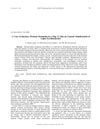Search
forLearn
5 / 8 resultslearn Mesotherapy
technique to inject very small amounts of beneficial chemicals into the scalp
learn Minoxidil
An essential vasodilator with some anti-androgenic effects, has excellent safety record
learn Follistatin
glycoprotein that inhibits TGF-β and promotes hair growth by antagonizing activin
learn Overview
Research
5 / 1000+ resultsresearch Finding Models for Skin Diseases: Successes and Failures
The document concludes that while finding animal models for the skin disease Hidradenitis suppurativa is challenging, certain mouse mutations may provide useful insights for research and drug testing.

research Clinical, Histopathological and Immunological Characteristics of Exfoliative Cutaneous Lupus Erythematosus in 25 German Short-Haired Pointers
A disease causing skin issues in young adult German short-haired pointers is hereditary, with most affected dogs not responding to treatment.

research Exfoliative Cutaneous Lupus Erythematosus in German Shorthaired Pointer Dogs: Disease Development, Progression, and Evaluation of Three Immunomodulatory Drugs (Ciclosporin, Hydroxychloroquine, and Adalimumab) in a Controlled Environment
Hydroxychloroquine showed some potential, but overall, the three drugs had limited success in treating lupus in dogs.

research A Case of Interface Perianal Dermatitis in a Dog: Is This an Unusual Manifestation of Lupus Erythematosus?
A dog with unusual skin lesions near its tail was successfully treated for a rare form of lupus.

research Steroid-Sparing Effect of Mycophenolate Mofetil in the Treatment of a Subepidermal Blistering Autoimmune Disease in a Dog: Clinical Communication
Mycophenolate mofetil helped reduce steroid use in treating a dog's autoimmune skin disease.
Community Join
5 / 107 resultscommunity Scientific evidence for Peppermint & Rosemary oils + My Experience
Natural treatments for hair loss, specifically peppermint oil and rosemary oil; how they can be used as a supplementary or alternative treatment to pharmaceuticals such as finasteride and minoxidil; and the personal experience of the user Divallo, who has seen an increase in density and thickness after using these oils for around 2.5 years. The post also touches on the potential antifungal properties of the oils and their effects on cutaneous blood flow.
community Being Safe on Oral Minoxidil: tl;dr on the literature.
Oral minoxidil is effective for hair loss but can cause cardiovascular side effects, such as pericardial effusion, especially in those with genetic predispositions. Starting with low doses and monitoring cardiovascular health are advised to reduce risks.
community New and Interesting HairLoss Studies/Papers/Reviews
Hair loss treatments discussed include Dutasteride with Ketoconazole, tissue engineering strategies, and androgenetic alopecia therapies. Massage doubles follicular retention, improving treatment effectiveness.
community The Korean began to suspect something. But they understood the mechanism to some extent. ( Cold shock therapy promotes hair growth in association with upregulation of cold-inducible RNA-binding protein and vascular endothelial growth factor)
Cold shock therapy may promote hair growth by stimulating follicular muscles and affecting stem cells. The exact mechanisms and full range of elements involved are not yet fully understood.
community Cold and Japanese researchers. The Japanese began to suspect something. But they understood the mechanism to some extent. ( Cold shock therapy promotes hair growth in association with upregulation of cold-inducible RNA-binding protein and vascular endothelial growth factor).
Cold shock therapy may promote hair growth, but cold alone is not effective. Combining treatments like minoxidil, finasteride, cold showers, spicy foods, and exercise may enhance results.